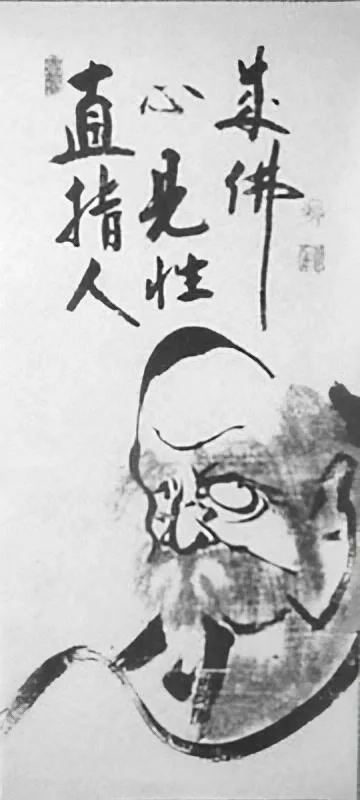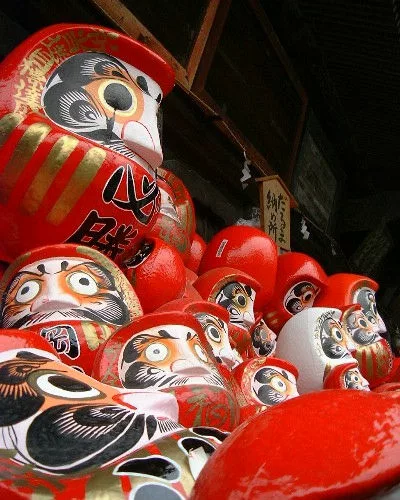If you’ve ever visited a Japanese shop or browsed through images of Japanese cultural items, you might have encountered a distinctive, round red doll with a bold yet enigmatic expression. These dolls are called “Daruma.” They hold a special place in Japanese culture and hearts. Let’s delve into these captivating dolls’ origin, artistry, and significance.
Zen Roots: The Origin of the Daruma DollRoots
The Daruma doll traces its origin to Bodhidharma (known as Daruma Daishi in Japanese), a Buddhist monk believed to have brought Zen Buddhism to China in the 5th or 6th century. According to legend, Bodhidharma meditated facing a wall for nine years. His commitment was so intense that his arms and legs withered away from lack of use—hence the Daruma doll’s signature limbless, rounded form.

A Unique Face in Buddhist Art
In Buddhist art, Bodhidharma is typically portrayed with a penetrating gaze, bushy eyebrows, and a beard—expressing spiritual intensity and mental discipline. These traits are visually echoed in the Daruma doll’s stylized face, representing steadfastness, endurance, and the unshakable spirit of Zen.
Takasaki’s Legacy: Birthplace of the Daruma Doll
Daruma dolls as we know them today originated in the 17th century in Takasaki, a city in Gunma Prefecture, Japan. They were first made by temple monks using papier-mâché, shaped to always return upright when tipped—symbolizing the Japanese proverb:
“Nanakorobi yaoki” (七転び八起き)
“Fall down seven times, get up eight.”
This built-in resilience made Daruma more than just a religious symbol—it became a beloved part of New Year traditions and personal goal-setting throughout Japan.

Daruma as a Partner in Perseverance
Unlike many decorative items, Daruma dolls are interactive. When you receive a Daruma, you fill in one eye while making a wish or setting a goal. The second eye is filled in only when your goal is achieved. This ritual creates a visual commitment—a constant reminder of your intention and progress.
For many Japanese, this practice turns the Daruma into a personal partner on the journey toward achievement. It’s both a spiritual tool and a motivational symbol, making it deeply meaningful in everyday life.
Modern Interpretations in Ceramic Art
Today, contemporary artisans continue to reinterpret the Daruma form through fine craftsmanship. At Kogei Art KYOTO, we’re proud to feature works like the ceramic Daruma dolls by Japanese artist Yuko Hayashi.
Each piece captures the energy of traditional Daruma figures while adding new dimensions of material and texture. Made from hand-sculpted ceramic, Hayashi’s Daruma are both art objects and spiritual icons—blending “Yō no bi” (用の美), or the beauty of utility, with deep cultural roots.

Click on the image below to see the ceramic Daruma doll created by Yuko Hayashi, which is currently on display at the Kogei Art KYOTO site.
Why Daruma Still Matters Today
The Daruma doll resonates in an era of rapid change and uncertainty. It reminds us that setbacks are temporary, and goals are within reach with persistence. Whether you are drawn to its Zen origins, artistry, or symbolism, the Daruma remains a powerful cultural touchstone that inspires, motivates, and endures.
Further Reading & References
- Addiss, Stephen. The Art of Zen: Paintings and Calligraphy by Japanese Monks 1600–1925. Harry N. Abrams, 1989.
- Moes, Robert. Daruma: The Founder of Zen in Japanese Art. Asian Art Museum of San Francisco, 1984.
- Gunma Prefectural Government. “Takasaki Daruma.” https://www.city.takasaki.gunma.jp
- Japan Cultural Profile. “Nanakorobi Yaoki: The Spirit of Resilience.” https://japan-culture.org
Revised on April 16, 2025






